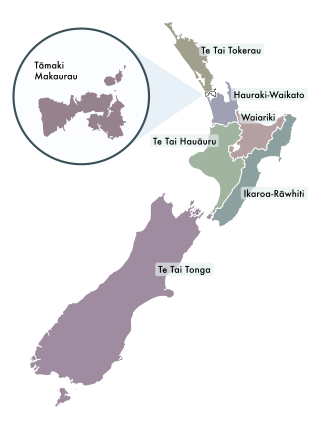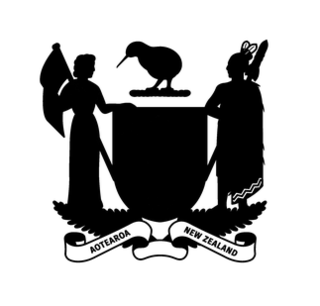Related Research Articles

The New Zealand Parliament is the unicameral legislature of New Zealand, consisting of the Sovereign (King-in-Parliament) and the New Zealand House of Representatives. The King is usually represented by his governor-general. Before 1951, there was an upper chamber, the New Zealand Legislative Council. The New Zealand Parliament was established in 1854 and is one of the oldest continuously functioning legislatures in the world. It has met in Wellington, the capital of New Zealand, since 1865.

Nándor Steven Tánczos is a New Zealand social ecologist, researcher, educator, activist and political commentator. He is currently a councillor in the Whakatāne District Council. He is also co-director of He Puna Manawa social and political change agency.
Te Pāti Māori, also known as the Māori Party, is a political party in New Zealand advocating Māori rights. With the exception of a handful of general electorates, Te Pāti Māori contests the reserved Māori electorates, in which its main rival is the Labour Party.

The monarchy of New Zealand is the constitutional system of government in which a hereditary monarch is the sovereign and head of state of New Zealand. The current monarch, King Charles III, acceded to the throne following the death of his mother, Queen Elizabeth II, on 8 September 2022 in the United Kingdom. The King's elder son, William, Prince of Wales, is the heir apparent.

In New Zealand politics, Māori electorates, colloquially known as the Māori seats, are a special category of electorate that give reserved positions to representatives of Māori in the New Zealand Parliament. Every area in New Zealand is covered by both a general and a Māori electorate; as of 2020, there are seven Māori electorates. Since 1967, candidates in Māori electorates have not needed to be Māori themselves, but to register as a voter in the Māori electorates people need to declare that they are of Māori descent.

The Canadian Oath of Allegiance is a promise or declaration of fealty to the Canadian monarch—as personification of the Canadian state and its authority, rather than as an individual person—taken, along with other specific oaths of office, by new occupants of various federal and provincial government offices; members of federal, provincial, and municipal police forces; members of the Canadian Armed Forces; and, in some provinces, all lawyers upon admission to the bar. The Oath of Allegiance also makes up the first portion of the Oath of Citizenship, the taking of which is a requirement of obtaining Canadian nationality.
An oath of citizenship is an oath taken by immigrants that officially naturalizes immigrants into citizens. It is often the final step in this process, and is usually done in a ceremonial capacity. An oath of citizenship is designed to be a statement of patriotism and loyalty to the new country. In countries which retain a monarchical system of government, an oath of allegiance to the monarch is often required as well. Adding an oath to God to the end of an oath is usually optional.

Māori politics is the politics of the Māori people, who were the original inhabitants of New Zealand and who are now the country's largest minority. Before the arrival of Pākehā (Europeans) in New Zealand, Māori society was based largely around tribal units, and chiefs provided political leadership. With the British settlers of the 19th century came a new British-style government. From the outset, Māori sought representation within this government, seeing it as a vital way to promote their people's rights and improve living standards. Modern Māori politics can be seen as a subset of New Zealand politics in general, but has a number of distinguishing features, including advocacy for indigenous rights and Māori sovereignty. Many Māori politicians are members of major, historically European-dominated political parties, while others have formed separate Māori parties. For example, Te Pāti Māori, holding six of seven Māori electorates, is one such party.

Hone Pani Tamati Waka Nene Harawira is a New Zealand Māori activist and former parliamentarian. He was elected to parliament as the member for the Māori electorate of Te Tai Tokerau in 2005 as the Māori Party candidate.

New Zealand Republic Inc. is an organisation formed in 1994 whose object is to support the creation of a New Zealand republic.

Republicanism in New Zealand is the political position that New Zealand's system of government should be changed from a constitutional monarchy to a republic.

The Oath of Allegiance is a promise to be loyal to the British monarch, and his or her heirs and successors, sworn by certain public servants in the United Kingdom, and also by newly naturalised subjects in citizenship ceremonies. The current standard wording of the oath of allegiance is set out in the Promissory Oaths Act 1868.
The Oath of Citizenship, or Citizenship Oath, is a statement recited and signed by those who apply to become citizens of Canada. Administered at a ceremony presided over by a designated official, the oath is a promise or declaration of fealty to the Canadian monarch and a promise to abide by Canada's laws and uphold the duties of a Canadian citizen; upon signing the oath, citizenship is granted to the applicant.
The Oath of Citizenship, as opposed to the Oath of Allegiance, is for new New Zealand citizens to pledge loyalty to the King of New Zealand, Charles III, and faithfully observe to the laws of New Zealand.

Te Tai Tokerau is a New Zealand parliamentary Māori electorate that was created out of the Northern Maori electorate ahead of the first Mixed Member Proportional (MMP) election in 1996. It was held first by Tau Henare representing New Zealand First for one term, and then Dover Samuels of the Labour Party for two terms. From 2005 to 2014, it was held by MP Hone Harawira. Initially a member of the Māori Party, Harawira resigned from both the party and then Parliament, causing the 2011 by-election. He was returned under the Mana Party banner in July 2011 and confirmed at the November 2011 general election. In the 2014 election, he was beaten by Labour's Kelvin Davis, ending the representation of the Mana Party in Parliament.

Kelvin Glen Davis is a New Zealand politician. He is a member of the House of Representatives, and was a senior minister in the Sixth Labour Government and the deputy leader of the New Zealand Labour Party from 2017 to 2023.
The Mana Movement, originally known as the Mana Party, is a former political party in New Zealand. The party was led by Hone Harawira who formed it in April 2011 following his resignation from the Māori Party. Harawira won the by-election in Te Tai Tokerau of 25 June 2011 for the Mana Party and retained the seat during the 2011 general election in November.
Rawiri Wikuki Waititi is a New Zealand politician and co-leader of Te Pāti Māori alongside Debbie Ngarewa-Packer. He has served as the Member of Parliament (MP) for Waiariki since 2020, when his election returned Te Pāti Māori to the New Zealand Parliament following their defeat at the 2017 general election.

A member of Parliament is a term typically used to describe an elected politician in the House of Commons of Canada, the lower chamber of the bicameral Parliament of Canada.

The 54th New Zealand Parliament is the current meeting of the legislature in New Zealand. It opened on 5 December 2023 following the 14 October 2023 general election, and will expire on or before 16 November 2026 to trigger the next election.
References
- ↑ Letters Patent Constituting the Office of Governor-General of New Zealand
- 1 2 "First Words: When an MP is sworn in - New Zealand Parliament". www.parliament.nz. 17 November 2023. Archived from the original on 2 January 2024. Retrieved 2 January 2024.
- ↑ Phil Goff (23 May 2004). "Oaths discussion document released". Beehive . Retrieved 16 February 2008.
- ↑ "Review of Oaths and Affirmations - Discussion Paper". Ministry of Justice (New Zealand). May 2004. Retrieved 16 February 2008.
- ↑ "Review of Oaths and Affirmations". Monarchist League of New Zealand. 14 February 2004. Archived from the original on 7 August 2009. Retrieved 16 February 2008.
- 1 2 "Bring the Oaths into the 21st Century". Republican Movement of Aotearoa New Zealand. 18 February 2004. Archived from the original on 12 October 2008. Retrieved 16 February 2008.
- ↑ Phil Goff (10 May 2005). "Oaths to be modernised by Bill". The Beehive . Retrieved 4 March 2008.
- ↑ "Knowledge Basket - text of the Oaths Modernisation Bill". Government Print Office. May 2005. Retrieved 4 March 2008.
- ↑ "Oaths Review". Monarchist League of New Zealand. 12 May 2005. Retrieved 16 February 2008.
- ↑ "New Oaths step in the right direction". Republican Movement of Aotearoa New Zealand. 10 May 2005. Archived from the original on 8 September 2008. Retrieved 16 February 2008.
- ↑ "Oaths Modernisation Bill". Parliament of New Zealand. 1 June 2010. Retrieved 21 July 2011.
- ↑ "Tanczos swears by the Treaty - Kahu News". NZ Herald. 3 January 2024. Retrieved 2 January 2024.
- ↑ Tracy Watkins (14 July 2011). "Speaker refuses to swear Harawira in". Stuff. Retrieved 14 July 2011.
- 1 2 Solomon, Serena (5 December 2023). "'Charles' or 'skin rash'? Māori MPs' oath of allegiance to king sparks translation debate". The Guardian. ISSN 0261-3077 . Retrieved 2 January 2024.
- 1 2 "Parliament swearing-in marked by Te Pāti Māori oaths". RNZ. 5 December 2023. Retrieved 2 January 2024.
- ↑ "Supplementary Order Paper 103 - Oaths Modernisation Bill" (PDF). Parliament of New Zealand. 29 March 2007. Retrieved 17 February 2008.
- ↑ "Oaths and Declarations (Members of Parliament) Amendment Bill". bills.parliament.nz. Retrieved 1 January 2024.